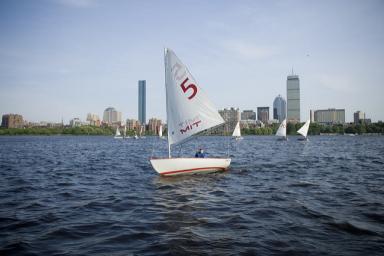In 2016, MITOS, the Office of Campus Planning, and its partners began the development of a plan to enhance the productivity of the campus’ built and ecological systems to capture, absorb, re-use and treat stormwater.

Water is an indispensable resource, not only for MIT, but also for the global community. Our campus’ health and activities are dependent on a consistent water supply for restrooms, drinking water faucets, showers, cafeterias, laboratories, and landscaping. Also, MIT’s Central Utilities Plant (CUP) provides the campus with electricity and thermal power through cogeneration, a process dependent on water.
MIT’s campus is situated in an urban, coastal area, abutting the Charles River and near the Atlantic coast. With changing weather patterns and an expected increase in stormwater, we will need to plan the built environment with the surrounding ecosystems in mind in order to create a resilient campus for the future. At the global level, water systems are critical for national economies, food supply, and public health, and will need to be adapted in order to meet the demands of the 21st century, including a growing population and a changing climate.
Our role at the MIT Office of Sustainability (MITOS) is to determine how we can ensure a reliable, resilient, sustainable water system on campus. Our engineers are working to minimize the water used in energy generation, discover methods of reuse to meet needs for both potable and nonpotable water, and investigate methods for ensuring an adequate supply of quality water at a time of growing human need and climate change.
Here are just a few of the water strategies we’re analyzing:
exploring creative ways to live with water
designing systems to mimic the way nature handles water
fostering the resiliency of our land and water systems in a time when climate change will increasingly result in drought
reducing pollution from stormwater and the risk of flooding from storms
improving the water quality of the Charles River watershed
developing energy production methods that do not rely heavily on water
To embrace a restorative set of solutions that maximizes the efficient use of municipal water and embraces the value and renewed quality of our local bodies of water as a source of critical natural services, recreation, and beauty.
MITOS is currently working collaboratively to transform the campus water systems via operations, education, research, and innovation in the following areas.
In 2016, MITOS, the Office of Campus Planning, and its partners began the development of a plan to enhance the productivity of the campus’ built and ecological systems to capture, absorb, re-use and treat stormwater.
In November 2015, the MIT Office of Sustainability released the first set of recommendations, generated by the 2014-2015 Sustainability Working Groups, which address the following topics: building design and construction; stormwater and land management; materials management; and green labs.

The MIT Water Summit is a gathering of students and faculty from MIT and the greater Boston area as well as leaders from industry, finance, government, and academia organized annually by the MIT Water Club to explore current problems and potential solutions surrounding water resources.

The Water Innovation Prize is a solutions-to-market competition aiming to help support the next breakthrough in the water sector
Serve as stewards of the evolving physical campus and provides services that guide and inform campus strategy and transformation.
Maintains the Institute's outdoor areas and provides a clean, comfortable, and functional environment for the community.
Students learn to apply advanced analysis and design to understand and solve pressing urban and environmental problems.
J-WAFS coordinates and promotes water and food research at MIT, emphasizing the deployment of effective technologies, programs, and policies that will have a measurable and international impact as humankind adapts to a rapidly expanding and evolving population on a changing planet.